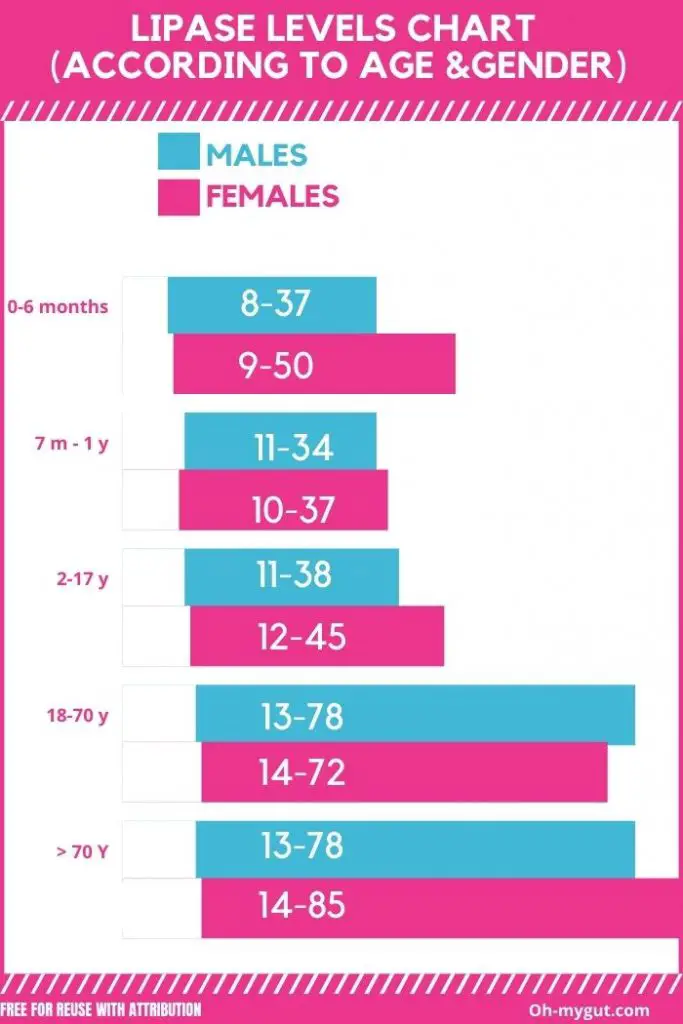Slightly Elevated Lipase: 5 Causes & When to Worry (Gastroenterologist explains).
Our content is not intended nor recommended as a substitute for medical advice by your doctor. Use for informational purposes only.
Lipase is a famous test that is often correlated with the presence of pancreatitis. However, lipase is typically highly elevated during acute pancreatitis (over 1,000 U/L in most cases).
People accidentally discover a slightly elevated lipase level during routine check-ups or when they face minor health issues.
A slightly elevated lipase without typical pancreatic pain doesn’t mean acute pancreatitis.
Today, we will dive into the possible explanations for slightly elevated levels.
1. What is lipase?
Lipase is an enzyme that digestion helps the digestion and absorption of fat and fat-soluble vitamins.
Your pancreas is the main site of lipase production. The enzyme is secreted into the duodenum (the first part of your small intestine) to act on ingested fat.
However, lipase is also present in other body organs, such as:
- The stomach and the intestines.
- The salivary gland (salivary lipase).
- The liver (hepatic lipase).
- The gallbladder.
- And others such as the brain and female pelvic organs.
- Lipase is also secreted in response to certain tumors such as breast, ovarian, and prostate cancers, and multiple myeloma.
The normal levels of lipase slightly vary according to age and gender. The normal range of lipase in adults is between 13-78 U/L.
The lipase is famous for detecting acute pancreatitis. However, several causes can lead to a slightly elevated lipase. Acute pancreatitis typically causes a profound increase in the lipase level (often above 1,000 U/L).
Slight elevations in lipase depend can occur due to various pancreatic and non-pancreatic causes.
But first, let’s define what is a (slightly elevated lipase) means?
2. What is considered a (slight) elevation in lipase levels?
Lipase levels slightly vary with age and gender. In addition, other chronic diseases such as renal impairment and medications may alter these levels and cause slight enzyme elevations.
The ranges of normal lipase according to age and gender are illustrated in the below chart.

Note that these levels vary among different laboratories. To define your upper limit of normal, check your laboratory reference ranges.
A significant elevation in lipase is considered when its levels exceed three times the upper limit of normal. Therefore, the 3X ULN is considered a cut-off level during the diagnosis of acute pancreatitis.
The levels that are just above the normal range but below the 3X upper limit of normal (ULN) are considered slight elevations in serum lipase.
3. Does slightly elevated lipase mean acute pancreatitis?
Pancreatitis is diagnosed when lipase is significant, not slightly, elevated (above 3 times the upper limit of normal)
Beware that lipase levels above 3 times the upper limit of normal are not 100% specific or sensitive for acute pancreatitis. So, pancreatitis is diagnosed based on the presence of at least 2 of the following 3 criteria:
- Lipase levels are three times ULN or more.
- Typical pancreatic pain: acute onset, persistent, and severe pain in the epigastrium (upper stomach area) that may radiate to the back.
- Abdominal imaging (Abdominal Ultrasound, contrast-enhanced CT, or MRI) shows typical features of acute pancreatitis.
But can a slightly elevated lipase mean acute pancreatitis?
The answer is no in more than 95% of the cases. This is simply because patients with acute pancreatitis typically have lipase levels that are greater than 3 times the upper level of lipase.
Rarely, patients may present with an acute attack of pancreatitis with slightly elevated (or even normal) lipase levels.
Acute pancreatitis can present with a slightly elevated lipase in the following conditions (reference):
1 . Acute attack on top of chronic pancreatitis.
Chronic pancreatitis causes continuous destruction of the pancreatitis tissues with loss of the cells that produce amylase and lipase enzymes.
If the patients experience an acute attack on top of chronic or previous recurrent pancreatitis, The elevations in serum lipase may be slight (less than 3 times the ULN).
2. Alcoholic pancreatitis.
Alcohol is one of the most common causes of acute and chronic pancreatitis. Patients with acute pancreatitis due to alcoholism may present with a slightly elevated lipase enzyme.
3. Delayed presentation of acute pancreatitis.
Lipase enzyme elevation lasts about 8-14 days after the onset of acute pancreatitis. If the condition is not investigated, and lipase starts to decline, lipase may be only slightly elevated if the testing of pancreatitis was late.
However, these conditions are the exception rather than the rule.
For your doctor to diagnose you with pancreatitis while having slight lipase elevation, he must fulfill the other two diagnostic criteria which include:
- Typical pancreatic pain.
- Typical features of pancreatitis in abdominal imaging (Ultrasound, CT, or MRI).
4. What are the possible causes of slightly elevated lipase levels?
Several causes of slight elevations in lipase enzymes, we can generally categorize into 5 main subcategories (reference):
- Pancreatic causes.
- Extrapancreatic causes.
- Decreased elimination of lipase from the body (in kidney disease).
- Medications.
- Unidentifiable causes (many causes of a slight elevation of serum lipase are asymptomatic and of unknown cause).
A. Pancreatic causes of slightly elevated serum lipase.
- Alcoholic pancreatitis (some cases).
- Late presentation of acute pancreatitis.
- Acute on top of chronic pancreatitis.
- Trauma to the pancreas (for example, in road traffic accidents).
- Post-ERCP (endoscopic retrograde cholangiopancreatography).
- Post-pancreatic surgery.
- Pancreatic cancer.
- Cystic fibrosis.
- Complications of pancreatitis after the attack (as pancreatic pseudocyst).
- Stones in the pancreatic duct.
B. Extrapancreatic causes of a slightly elevated lipase:
Several conditions may lead to a slight elevation in serum lipase. Common examples include:
- Acute cholecystitis.
- Bowel obstruction or infarction.
- Duodenal ulcers.
- Type 2 diabetes mellitus.
- Diabetic ketoacidosis.
- HIV disease.
- HCV (hepatitis C virus) infection.
- Sarcoidosis.
- Celiac disease.
- Inflammatory bowel disease (Crohn’s disease and ulcerative colitis).
- Macrolipasemia (presence of lipase with an abnormally large molecular size).
- Critical illness.
C. Decreased elimination of lipase from the body.
In kidney diseases, your body may become unable to get rid of lipase properly. So, a slight elevation in serum lipase may occur in patients with chronic kidney disease.
D. Drugs that cause elevated lipase:
The drugs that cause elevated lipase levels are illustrated in the table below.
| Drugs Causing Elevated Lipase |
| Adrenocorticotropic hormone |
| Ardeparin |
| Cholinergics (eg, bethanechol) |
| Dipeptidyl peptidase-4 (DPP-4) inhibitors |
| Fat emulsions |
| Furosemide |
| Indomethacin |
| Methacholine |
| Methylprednisolone |
| Metronidazole |
| Narcotics (eg, codeine) |
| Oral contraceptives |
| Pegaspargase |
| Pentazocine |
| Secretin |
| Sulfisoxazole |
| Thiazide diuretics |
| Triprolidine/pseudoephedrine |
| Valproic acid |
| Zalcitabine |
E. Idiopathic mildly elevated serum lipase.
In many cases (particularly when the abdominal pain is absent), no causes could be identified for elevated lipase.
In such cases, if the elevation is mild and you have no symptoms, your doctor may not need to perform any further investigations. Always discuss the issue with your doctor.
5. Other FAQs about slightly elevated serum lipase.
A. What causes a slightly elevated lipase with normal lipase?
The main causes of isolated or predominant lipase levels include:
- Delayed presentation of acute pancreatitis.
- Acute alcoholic pancreatitis.
- Acute on top of chronic pancreatitis.
- Hypertriglyceridemia-induced pancreatitis.: a condition in which a very high level of blood triglycerides (usually above 1000) causes acute pancreatitis.
B. When to see a doctor about elevated lipase?
Any deviation from the normal range of lipase should be discussed with your health care providers.
In many cases, the mild elevations in serum lipase are not a cause of concern.
But you have to worry if the elevation is associated with:
- Typical pancreatic pain (acute onset, persistent, and severe upper stomach pain (epigastric pain may radiate to the back).
- Fever.
- Vomiting or severe nausea.
- Severe or recurrent diarrhea.
- Weight loss.
- Blood in the stool (reddish or blackish stool).
- Vomiting of blood.
- Severe unexplained abdominal pain.
- Severe abdominal disetension.
- Medications (listed above).
- Being alcoholic.
- Recent history of trauma to the abdomen or the brain.
C. Should a slightly elevated serum lipase be treated?
Slightly elevated lipase levels can result from a diversity of causes. Therefore, the treatment of this condition is directed to the cause. But most of the time, slight elevations of lipase without abdominal pain or apparent cause don’t require specific treatments.
However, if the cause is identifiable (such as acute pancreatitis, tumor, etc), the treatment of elevated lipase is directed towards eliminating the cause.
D. Can lipase be elevated without pancreatitis?
Lipase is not 100% specific for pancreatitis. Even lipase levels above three times the upper limit of normal can occur with various conditions. So, lipase can be elevated without pancreatitis.
Common conditions that may cause lipase elevations (3X ULN) without pancreatitis (reference):
- Liver diseases.
- Biliary diseases such as biliary obstruction and acute cholecystitis.
- Macrolipasemia.
- Gastroduodenal diseases (ulcers or perforations).
- Intestinal infarction or bowel obstruction.
- Brain pathology such as hemorrhage.
- Severe (critical) illness.
- Drugs.
- Certain infections.
- Evidence-based
- Written by a doctor.

Related Posts:
- Lipase levels 101: Normal Range, Elevated, Low Levels & More
- When to worry about ALT levels? Gastroenterologist Explains.
- 5 Causes of Elevated Liver Enzymes & Negative Ultrasound
- Fluffy Poop: 7 Causes & When to Worry (Doctor Explains).
- 5 Gallbladder Symptoms in Men& When to Worry…
- Norovirus Poop Color Changes & When To Worry (GI…











